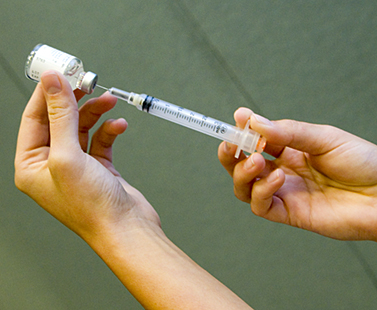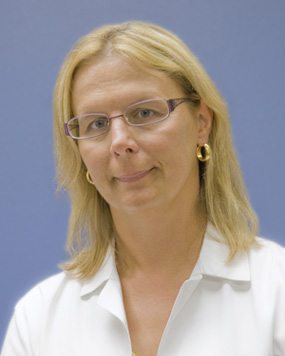USF to test H1N1 vaccine in pregnant women and children who are HIV-infected

The USF arm of the NIH trials will be performed at Genesis, Tampa General Hospial and USF clinics.
Tampa, FL (Oct. 26, 2009) — The University of South Florida is participating in two federal studies to see whether the H1N1 vaccine can safely elicit a protective immune response in pregnant women, as well as in children and young adults, all of whom are HIV-infected.
USF will be one of 35 sites and eight sub-sites in the United States and Puerto Rico participating in the two studies, which are sponsored and funded by the National Institute of Allergy and Infectious Diseases (NIAID) and the Eunice Kennedy Shriver National Institute of Child Health and Human Development (NICHD), both part of the National Institutes of Health. Investigators plan to vaccinate about 130 HIV-infected women and 140 HIV-infected children and young adults around the country.
USF is participating in both studies as part of its role as a site of the International Maternal-Pediatric-Adolescent AIDS Clinical Trials Group (IMPAACT) network, a project of NIAID and NICHD that develops and implements multi-center HIV treatment and prevention research trials.
In the first study, on HIV-infected pregnant women, about 10 women are expected to be enrolled in the Tampa Bay area, said Dr. Karen L. Bruder, USF assistant professor of obstetrics and gynecology and the principal investigator for USF’s study site. Dr. Bruder also is medical director of the Genesis at HealthPark clinic of Tampa General Hospital.
The study is particularly important for this group of women because pregnant women already are at greater risk of suffering serious complications from the H1N1 virus, largely because their immune systems do not function at their normal levels. If a pregnant woman also is infected with HIV, her immune system is further compromised.
“She is already immuno-suppressed,” Dr. Bruder said.

Dr. Karen Bruder leads the USF study site testing whether the H1N1 vaccine protects HIV-infected pregnant women.
The study will look at how the vaccine affects the woman and her infant — for instance, how many antibodies to the H1N1 influenza virus does the woman develop in response to the vaccine? Are those antibodies transferred to the fetus? After the baby is born, does it still have antibodies to the virus?
The study will also evaluate whether the vaccine affects the woman’s HIV viral load or the cells in the immune system that are often affected by HIV.
Women in the study will receive two doses of vaccine. The women’s response to the vaccine will be evaluated during pregnancy, at delivery, and at 3 and 6 months after delivery. The babies will be evaluated when they are 3 and 6 months old.
USF’s work in the study will be performed at Genesis, Tampa General and at USF clinics.
In the second study, at least four HIV-infected children or young adults will receive the H1N1 vaccine at the USF clinics, said Dr. Jorge Lujan-Zilbermann, associate professor of pediatrics and principal investigator for the USF site of the study.
This study will divide subjects into three age groups: ages 4 to 9, 10 to 17, and 18 to 24. As in the first study, the children and young adults will receive vaccine in two doses three weeks apart. Study subjects will be followed for seven months.
The study will examine how safe the vaccine is, how effectively it stimulates the immune system to make antibodies to the H1N1 influenza virus, and how long children and young adults maintain these antibodies in their blood after being vaccinated. The study will also look at other immune responses.
The vaccine all study subjects will receive contains inactivated virus, so it will not be possible for them to contract H1N1 influenza from the vaccine. Because of the increased vulnerability of HIV-infected pregnant women, children and youth, the trials will test whether doses of the licensed 2009 H1N1 influenza vaccine that are higher than doses being tested in other groups can safely elicit protective immune responses in these populations.
The IMPAACT sites participating in these studies will receive vaccine from Novartis Vaccines and Diagnostics of Cambridge, Mass, through the Office of the Assistant Secretary for Preparedness and Response for the U.S. Department of Health and Human Services.
For more information about NIH-sponsored clinical trials of H1N1 influenza vaccine in HIV-infected pregnant women, children and youth, see http://www3.niaid.nih.gov/news/newsreleases/2009/H1N1HIVTrials.htm and http://www3.niaid.nih.gov/news/QA/H1N1VacHIVChildYouthPregWomenqa.htm
– USF Health –
USF Health is dedicated to creating a model of health care based on understanding the full spectrum of health. It includes the University of South Florida’s colleges of medicine, nursing, and public health; the schools of biomedical sciences as well as physical therapy & rehabilitation sciences; and the USF Physicians Group. With more than $380.4 million in research grants and contracts last year, USF is one of the nation’s top 63 public research universities and one of 39 community-engaged, four-year public universities designated by the Carnegie Foundation for the Advancement of Teaching. For more information, visit www.health.usf.edu
– Story by Lisa Greene, USF Health Communications
– Photos by Eric Younghans, USF Health Communications

